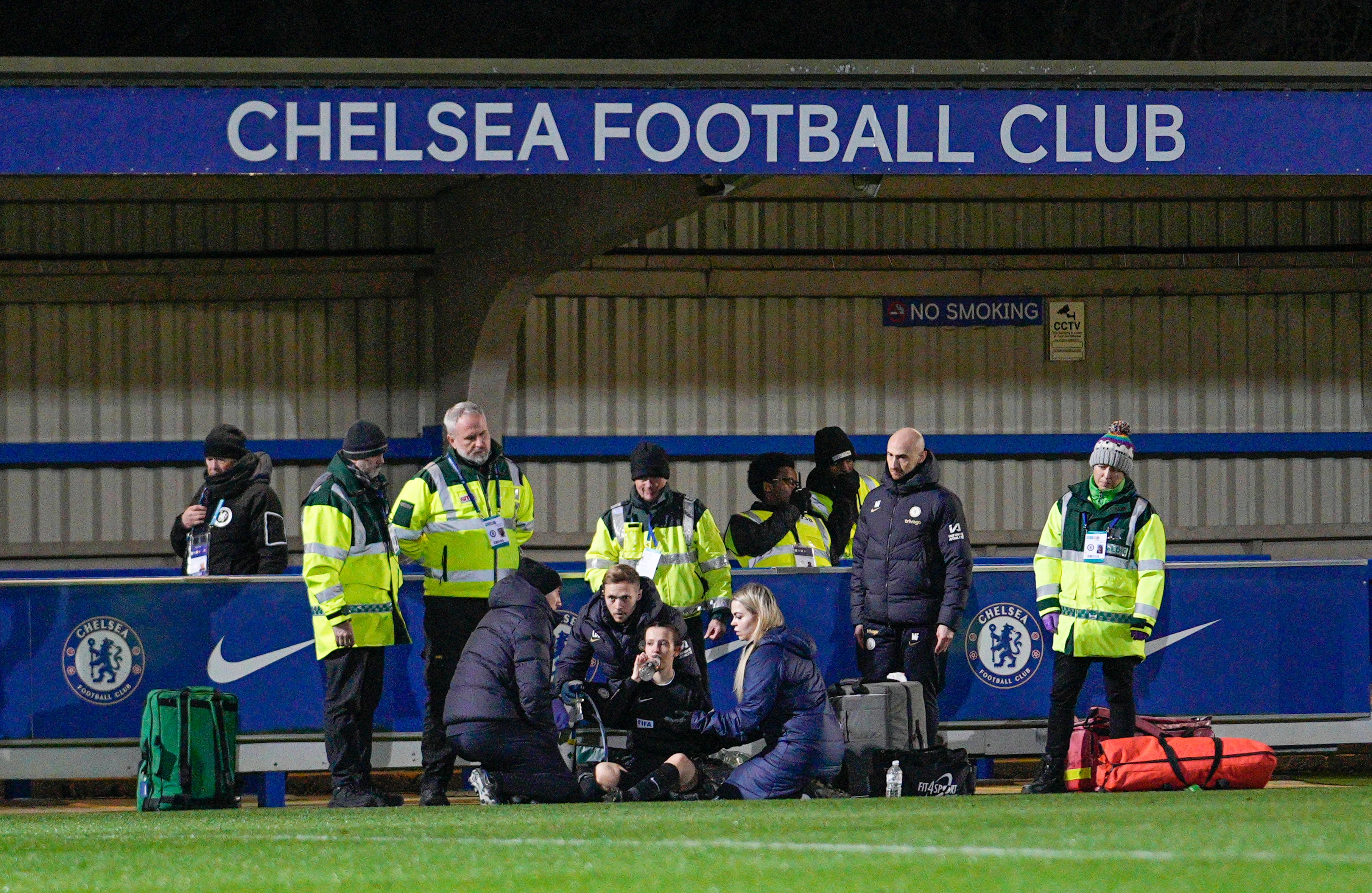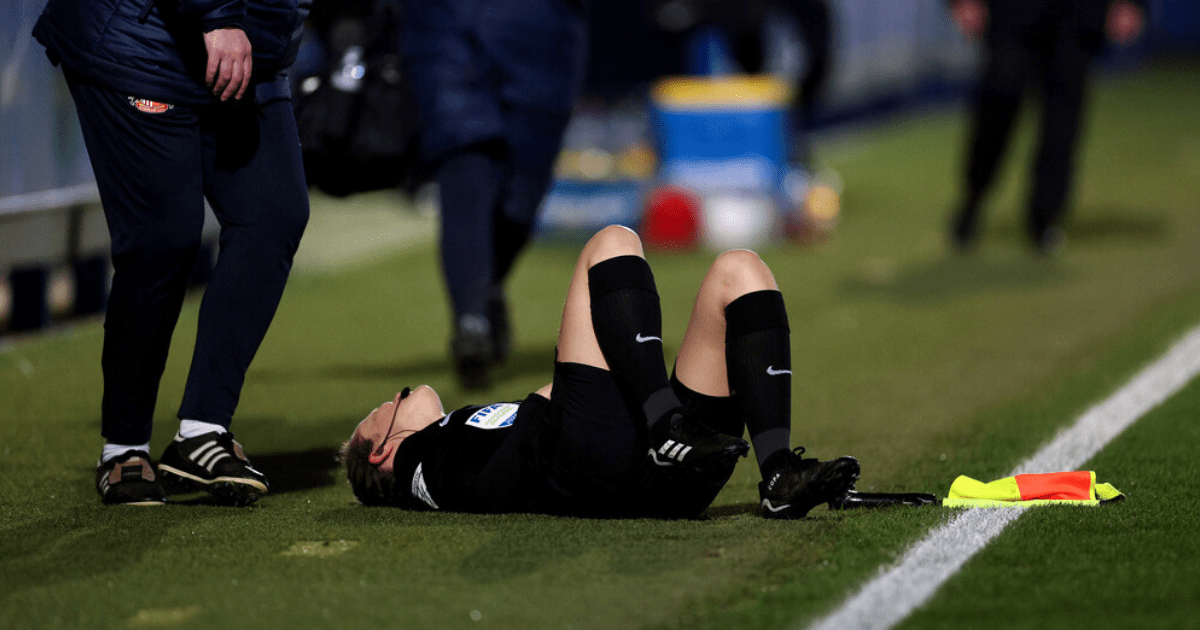What Happened?
The clash between Chelsea women and Sunderland in the FA Women's Continental Tyres League Cup was temporarily suspended after an injury to assistant referee Ceri Williams. The incident occurred just after the ten minute mark of the quarter final at Kingsmeadow.
Injury and Medical Assistance
Williams went down in agony and was seen laid flat on her back. The referee called for medical assistance, and play was temporarily halted as medics rushed to treat her. There were concerns about the seriousness of the injury.
Replacements and Support
Williams was eventually replaced by the fourth official as she appeared to support her left arm while leaving the pitch. Concerned viewers expressed their hopes that the injury is not serious.
A Rising Career
Williams, a 28-year-old from Swansea, started her refereeing journey in Welsh grassroots football. She then progressed to become an assistant referee and has been listed by FIFA. She has officiated at the international level, including in the UEFA Women's Champions League. Williams made history as the first Welsh woman to officiate in a UEFA men's competition and recently officiated in the UEFA Women's U19 European Championship Final.

No Update Yet
As of my last knowledge in September 2021, no update or confirmation of Williams' injury has been announced. We hope for the best for her recovery.
Frequently Asked Questions
Should I use compression gear while playing football?
Compression gear like shorts, leggings and tops may be beneficial for players of football. These items can help improve blood circulation, reduce muscular fatigue and speed up recovery following a match or training. A tight-fitting material may also help to stabilize the muscles. However, the choice to wear compression gear is personal, and comfort should be the primary consideration when selecting such equipment.
Can the choice in socks have an impact on a football player’s performance?
Absolutely. Football socks are made to protect and cushion the feet of players during intense games. They provide cushioning, help keep shin guards secure, reduce friction and prevent blisters. The right pair of socks can enhance a football player’s comfort and indirectly affect their performance.
What factors should I take into consideration when selecting a ball?
When selecting a soccer, you should consider its size, the construction and the material. Players aged 12 and up, including adult players, should use size 5. For younger players, smaller sizes are recommended. Leather is best for grassy surfaces, while synthetics are better for more rough surfaces. Thermal-bonded soccer balls offer superior waterproofing, shape retention and durability compared to traditional stitched versions. Durability, feel, and flight are other important features to look at.
How do I ensure the proper fit for my football boots?
To ensure proper fit for your football boots, they should be snug but not too tight, allowing for some movement without the foot sliding inside the boot. There should be about a thumb’s width of space between the toes and the front of the boot to avoid cramming the toes when running or kicking. The width of the foot is also important. Choose a boot with a wide or narrow fit. For the best fit, try on boots while wearing football socks.
Is there a specific regulation regarding the equipment that is used during competitive football games?
The rules of competitive football games often include specific equipment requirements to protect the players and ensure game integrity. The rules of football stipulate that standard equipment is required, including jerseys with sleeves and shorts. Also, socks are required to cover the shin guards. The use of equipment or accessories that are dangerous to the player, or even their opponents, is prohibited. Players must adhere to the rules and regulations that vary depending on leagues, age groups, etc. to avoid penalties.
Statistics
- Around 25% of youth football players have reported using equipment that is either outdated or not suited to their position on the field.
- Studies show that the proper use of shin guards can reduce the risk of injuries in football players by up to 70%.
- Goalkeeper gloves with advanced grip technology have been adopted by 85% of professional goalkeepers in top leagues around the world.
- Globally, the demand for lightweight football cleats has risen by about 30% in the past decade, reflecting changes in player preferences and playing styles.
- Research has indicated that around 60% of football-related ankle injuries could be mitigated with the correct choice of footwear.
External Links
podiatrytoday.com
adidas.com
soccer.com
nike.com
footy.com
How To
How To Care For Your Football Equipment
By maintaining your football gear, you can extend its life and maintain good hygiene. Boots should always be cleaned after use and left to air dry. Avoid using direct heat as it can damage material. Shin guards and glove should be cleaned and allowed to air out in order to avoid odor build-up. Examine your gear on a regular basis for signs and wear. Pay special attention to areas that receive the most stress while playing. Follow the manufacturer’s instructions when washing protective padding and apparel to prevent shrinkage.

